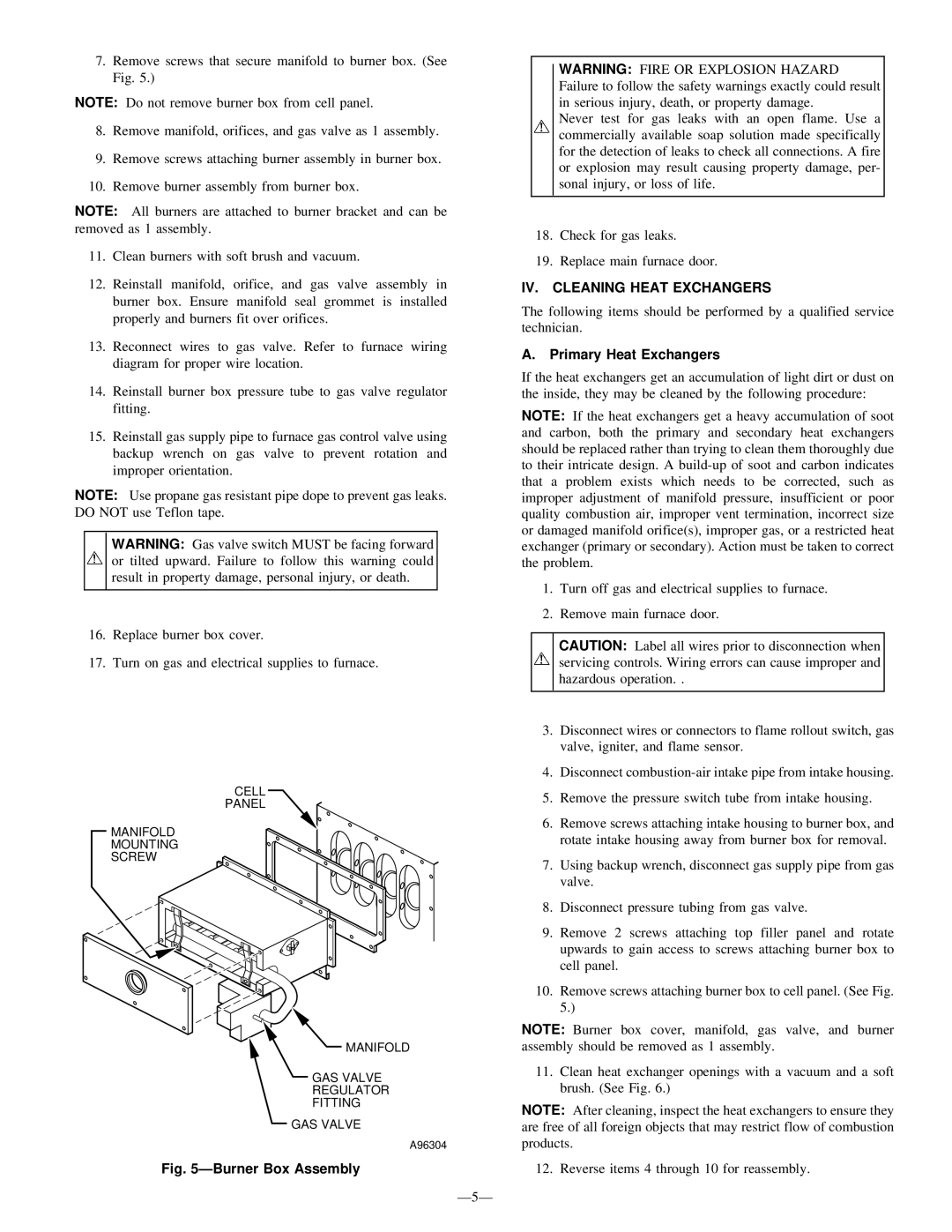
7.Remove screws that secure manifold to burner box. (See Fig. 5.)
NOTE: Do not remove burner box from cell panel.
8.Remove manifold, orifices, and gas valve as 1 assembly.
9.Remove screws attaching burner assembly in burner box.
10.Remove burner assembly from burner box.
NOTE: All burners are attached to burner bracket and can be removed as 1 assembly.
11.Clean burners with soft brush and vacuum.
12.Reinstall manifold, orifice, and gas valve assembly in burner box. Ensure manifold seal grommet is installed properly and burners fit over orifices.
13.Reconnect wires to gas valve. Refer to furnace wiring diagram for proper wire location.
14.Reinstall burner box pressure tube to gas valve regulator fitting.
15.Reinstall gas supply pipe to furnace gas control valve using backup wrench on gas valve to prevent rotation and improper orientation.
NOTE: Use propane gas resistant pipe dope to prevent gas leaks. DO NOT use Teflon tape.
WARNING: Gas valve switch MUST be facing forward or tilted upward. Failure to follow this warning could result in property damage, personal injury, or death.
16.Replace burner box cover.
17.Turn on gas and electrical supplies to furnace.
CELL
PANEL
MANIFOLD
MOUNTING
SCREW
MANIFOLD
GAS VALVE
REGULATOR
FITTING
GAS VALVE
A96304
Fig. 5—Burner Box Assembly
WARNING: FIRE OR EXPLOSION HAZARD Failure to follow the safety warnings exactly could result in serious injury, death, or property damage.
Never test for gas leaks with an open flame. Use a commercially available soap solution made specifically for the detection of leaks to check all connections. A fire or explosion may result causing property damage, per- sonal injury, or loss of life.
18.Check for gas leaks.
19.Replace main furnace door.
IV. CLEANING HEAT EXCHANGERS
The following items should be performed by a qualified service technician.
A. Primary Heat Exchangers
If the heat exchangers get an accumulation of light dirt or dust on the inside, they may be cleaned by the following procedure:
NOTE: If the heat exchangers get a heavy accumulation of soot and carbon, both the primary and secondary heat exchangers should be replaced rather than trying to clean them thoroughly due to their intricate design. A
1.Turn off gas and electrical supplies to furnace.
2.Remove main furnace door.
CAUTION: Label all wires prior to disconnection when servicing controls. Wiring errors can cause improper and hazardous operation. .
3.Disconnect wires or connectors to flame rollout switch, gas valve, igniter, and flame sensor.
4.Disconnect
5.Remove the pressure switch tube from intake housing.
6.Remove screws attaching intake housing to burner box, and rotate intake housing away from burner box for removal.
7.Using backup wrench, disconnect gas supply pipe from gas valve.
8.Disconnect pressure tubing from gas valve.
9.Remove 2 screws attaching top filler panel and rotate upwards to gain access to screws attaching burner box to cell panel.
10.Remove screws attaching burner box to cell panel. (See Fig. 5.)
NOTE: Burner box cover, manifold, gas valve, and burner assembly should be removed as 1 assembly.
11.Clean heat exchanger openings with a vacuum and a soft brush. (See Fig. 6.)
NOTE: After cleaning, inspect the heat exchangers to ensure they are free of all foreign objects that may restrict flow of combustion products.
12. Reverse items 4 through 10 for reassembly.
